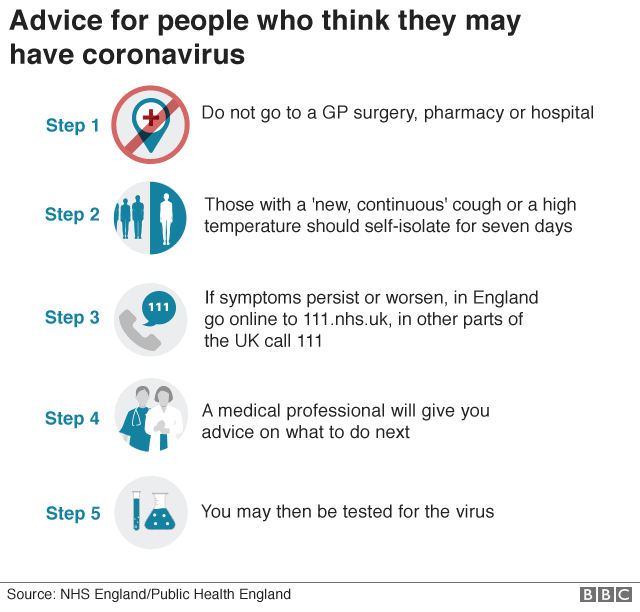What To Do If You Get Symptoms
Measures against Covid-19 are changing as the national situation changes. There are currently 1140 confirmed cases. As tests are now only happening in hospital, for the most ill, the real figure is undoubtedly higher than this, so we will be referring to the official confirmed cases as “severe confirmed cases”. There are currently 9 severe confirmed cases in Derbyshire. The location for the highest number of severe confirmed cases is Hertfordshire. We do not know if they have more infected people, or if they are better at testing for it.

What you should do if you become unwell
You are no longer advised to phone 111 if you have any cold or flu symptoms.
The current advice, within the official Delay phase, it to self isolate for 7 days if you have a continuous cough or a high temperature. Having a cough or a temperature does not necessarily indicate Covid-19, and at this stage of the national epidemic most self isolating cases are likely to be flu or the common cold. If your situation gets worse, you should call 111. The 111 line is overwhelmed, and not staffed at a high enough level to deal with the current demand for advice.
Current advice is to NOT go to your Doctor’s surgery, pharmacy or hospital if you are unwell. Ignoring this advice will result in the closure of small facilities for decontamination, meaning that others cannot get medication or help. Hospitals were unable to cope with normal levels of illness before the pandemic arrived, and will only deal with the most serious cases. Going to a hospital without being a severe case increases your risk of contracting the virus. If you require additional help, calling 111 is the first action, and you will then be given further advice.
Ultimately it is being left up to us to look after ourselves and our community unless we have serious difficulties. The advised measures are for the protection of others.
Treat any symptoms with cold remedies. French authorities have warned that anti-inflammatories may help the virus and make it worse. This is being investigated, but they are warning people to only use paracetamol, and avoid ibuprofen and cortisone. Anyone needing anti-inflammatories on a regular basis for other health issues should speak to their doctor.
Outside of official advice, a great many people are voluntarily isolating, either completely or by reducing all but essential movement outside the home. This is likely to protect more people than the specious notion of herd immunity, which always requires a very high level of vaccination to genuinely work.



Thank you. I was wondering what was suppose to hapoen if feeling unwell. My only problem – Paracetamol – over the weekend I have been to 7 different shops – none on the shelves or in.my cupboard, sadly. People need to stop what they’re doing and think about others. I was of the opinion Belper was a very community orientated town, obviously words are cheap and when there’s a problem, it’s look after number 1. I am ashamed and disappointed at the population at the moment.
I’m not sure why aspirin is not mentioned by the French but it is also an anti-inflammatory like ibuprofen and probably should also be avoided.